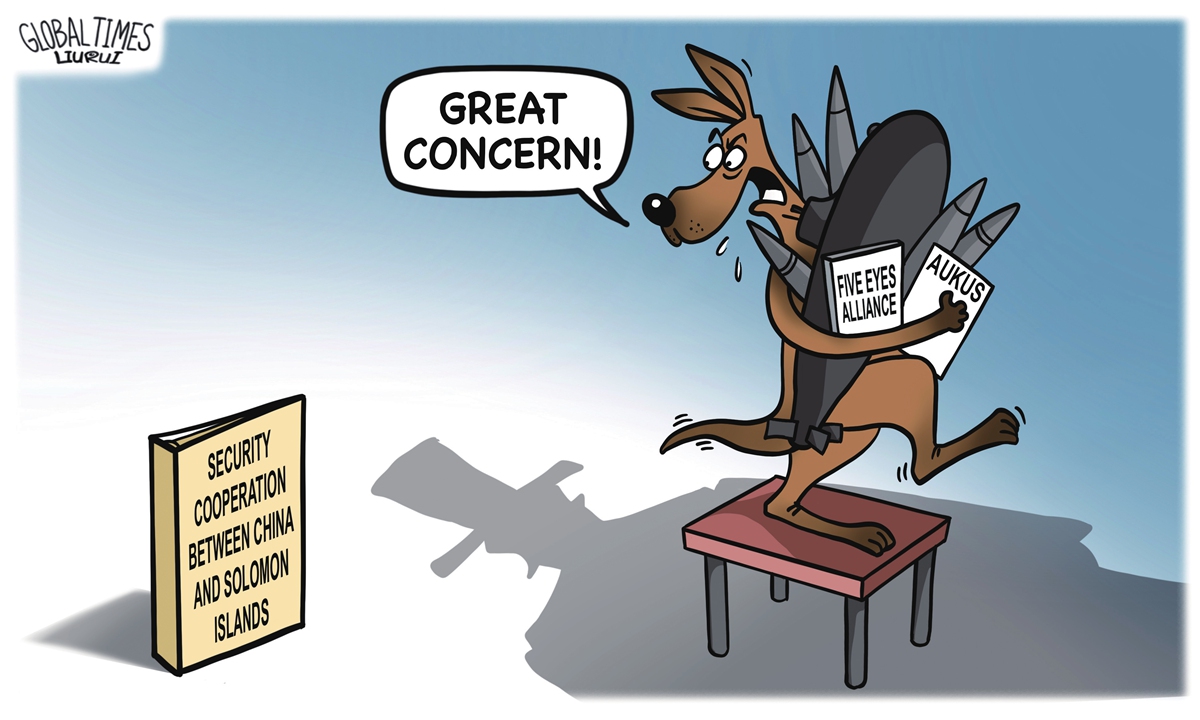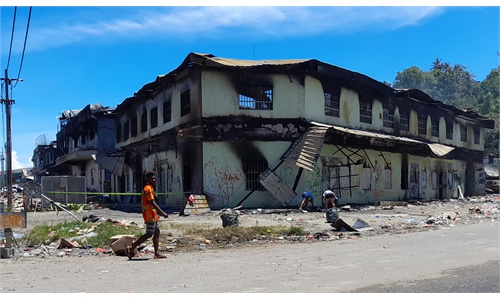Australia needs realistic perspective on regional security, not fretting about China

Australia Illustration: Liu Rui/GT
About six months ago, Australia signed the controversial AUKUS pact, which will enable it to acquire nuclear submarine technology from the US and UK.
Australian Prime Minister Scott Morrison revealed that the new security agreement with the UK and US will also focus on "cyber capabilities, artificial intelligence, quantum technologies and additional undersea capabilities." Essentially, it is a big deal - setting up a new intelligence community in addition to the already aggressive Five Eyes alliance and NATO, which have their own military agendas within the Indo-Pacific, neither of them well disposed toward China.
A fleet of nuclear submarines amounts to quite a big additional stick to wave at China, which is already surrounded by the military outposts of Western nations. Naval forces from the US and NATO regularly exercise in and patrol China's maritime backyard. China could be forgiven for feeling that a noose is being placed around its neck. America already has about 132,000 troops stationed in the Indo-Pacific. And although there has been no American ambassador to the Solomon Islands for about three decades, the US said in February that it suddenly wants to reopen its embassy there.
So why, last week, was there hysterical overreaction to a tiny shipment of non-lethal weaponry - 95 rifles and 92 pistols - to the Solomon Islands? The guns cannot be loaded or fired as they are replicas, obviously intended for peaceful use by Solomon Islands' police. The commissioner of the Royal Solomon Islands Police Force (RSIPF) Mostyn Mangau was quoted as saying the fake firearms are strictly for training purposes: "These things do not in any way threaten the security of this country so far, except they are as good as helping RSIPF in building its tactical knowledge and capabilities."
Could the explanation for the anger be that there is a connection to China? This would not be the first time Australian hostility seemed to have been triggered by the mere presence of its neighbor across the ocean.
Last year saw an eruption of unrest on the islands, and the Australian police and military sent a peacekeeping force. Later, Chinese police officers were deployed to the Solomon Islands to help local authorities maintain order and guard Chinese interests, many of which had been damaged in the rioting. China, like Australia, has good relations with the islands.
The problem is that Australia does not like that China and the Solomon Islands want to agree that China will again assist, if asked, the impoverished nation of more than 900 islands strung across almost 1,000 miles of sea. The deal allows the Solomon Islands government to request security personnel and supplies from China. Ships may also visit. The draft pact was originally leaked online and later confirmed by the office of Prime Minister Manasseh Sogavare. He said there was room for security agreements with both China and Australia: "In diversifying the country's security partnership including China, the government is working to sign off and implement a number of development frameworks with China to further create a safe and secure environment for local and foreign investments."
Australia sealed its own security pact with the Solomon Islands in 2017, but does not seem to want anyone else to have one, especially China. Reaction from Canberra has been swift and petulant. There was talk of China being allowed, depending on which headline was read, into Australia's "backyard" but also onto its "doorstep."
Defense Minister Peter Dutton warned gloomily: "The likelihood of a conflict in our own region in the Indo-Pacific is more and more real every day."
The executive director at the Australian Strategic Policy Institute, Peter Jennings, said it was an unacceptable threat, adding: "This is something we simply have to stop."
One commentator even argued that Australia should assemble an amphibious force to invade the Solomon Islands and replace the government. An editorial in the economics publication Macrobusiness described it as "Australia's Cuban missile crisis" and called on Morrison to force a confrontation.
But if anything threatens the security of the region, it is less likely to be an assistance agreement between China and Solomon Islands, and more likely to be a US-driven arms race in the region. Replica guns are not Australia's Cuban missile crisis - but hundreds of new missiles aimed at China could provoke one. Australia really needs to get a sense of perspective and appreciate the distinction between weapons that can destroy armies and submarines that can wipe out cities, and a police force being supplied with a few dozen replica guns: however realistic they may look, they don't fire bullets, and don't even go pop.
The author is a journalist and lecturer living in Britain. opinion@globaltimes.com.cn

